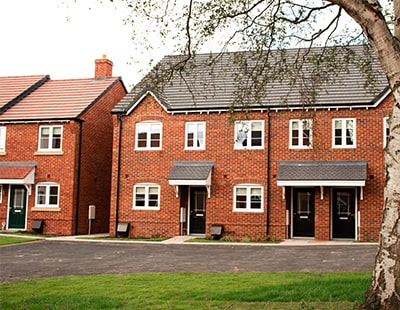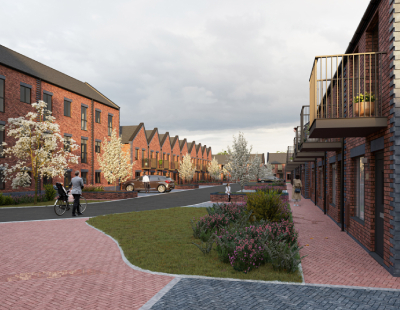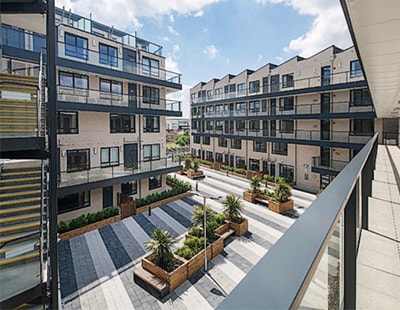We spoke with Mark Gratton, land and development manager at Wise Living, the SDL Group’s BTR platform, and Chris Summers, head of franchising at Century21 UK, to find out how their businesses adapted to lockdown and what impact it had on investor and residential behaviour.
How did your team initially adapt after lockdown measures were first introduced?
 Mark (right): At Wise Living, we began preparing a few weeks before lockdown. We knew looking to other countries the kinds of measures that were likely to come into place in the property sector and in society in general, so we took steps to ensure we would be ready to keep staff and customers safe while at the same time enabling us to maintain a good service.
Mark (right): At Wise Living, we began preparing a few weeks before lockdown. We knew looking to other countries the kinds of measures that were likely to come into place in the property sector and in society in general, so we took steps to ensure we would be ready to keep staff and customers safe while at the same time enabling us to maintain a good service.
The team was equipped to work remotely. We even had a trial period, with some members of the team working from home so we could see what did and didn’t work.
For prospective tenants, obviously physical viewings couldn’t go ahead to keep people safe, but the pictures and floor plans of our available lets and information provided by our team online and over the phone served as a good substitute and we were still able to showcase the quality of our rental properties.
Chris: Like Wise Living, we too were able to support our network of Century21 UK franchisees by setting them up to work remotely. We moved our systems to cloud-based software so that it meant all members of the team could still have access to the information, tools and resources they needed to perform their role.
For estate agents, it was pretty much overnight that we had to close and move to working remotely so it was a challenge, but one that the team across the country rose to extremely well. We increased our level of support for franchisees even further to help them get through a very difficult period and reduce disruption to their business.
We worked with renters, landlords and agents to negotiate deals to support everyone through the situation as much as we could.
With significant measures put in place restricting usual activity in the property market, it was predicted that viewings, enquiries and interest would dramatically slow down in lockdown. Did the reality meet the expectations?
Mark: Looking at it from a BTR perspective, this wasn’t the case and lockdown only proved the market’s resilience. It showed that if there are people out there determined to find a new home, even if they couldn’t move in right away or see their desired property in person, they are still willing to make a decision if they find top-quality BTR properties.
Looking at our Mansfield Old Brewery development, all our homes in phases one and two have now been reserved. That was in the space of two months from launching them at the beginning of April, to the end of May. This was all while we were in lockdown - it’s a real testament to demand in the area, and for high-quality rental stock in general.
Our Telford and Birkenhead developments at this point remain fully let, too, and our team in Coventry is back on site as they are at the construction stage. For us, although we had to make changes to the way we worked, interest and demand remained high throughout.
 Chris (left): In lockdown, many of our Century21 UK branches performed extremely well, especially when you compare it against what the market feared could happen and the forecast performance of branches before Covid-19 had to be taken into consideration.
Chris (left): In lockdown, many of our Century21 UK branches performed extremely well, especially when you compare it against what the market feared could happen and the forecast performance of branches before Covid-19 had to be taken into consideration.
Take, for example, our Southampton office. During lockdown it averaged about 25 new lets a month.
Normally we’d expect to see that number hit around 35, so to be at about 80% of what it would normally achieve, considering the circumstances, the team there did an amazing job.
We also saw branches make really intelligent moves to increase business. Our Ilford office contacted groups who owned large numbers of properties that they’d usually let out on Airbnb. During lockdown they were unable to do this, so our Ilford office offered to arrange deals for six-month lets.
They, of course, wouldn’t have been able to make the same income as they usually would, but this enabled these businesses to offset some of those losses. Other franchisees followed suit and did the same.
Looking at it from an investor perspective - experts predicted that investor appetite in BTR would in the short-term go on hold and only BTR projects/schemes that were already underway would be complete. Are you still seeing strong interest from investors at this time in BTR and how has this changed from before lockdown began?
Mark: For Wise Living, investor confidence has remained strong. They look at our model and weigh up the risk involved. If you’re investing in around 50 to 100 standalone units rather than a large, high-rise apartment block in a city centre, it’s much easier to fill and let that number of units. Residential properties remain a safe place very much for investors to deploy capital.
Throughout the last few months, we have continued to work with existing housing partners and developers. Naturally, towards the beginning of lockdown, opportunities and discussions around new sites quietened down for a short period of time as businesses focused on adapting to the circumstances, but it really bounced back quickly because of a mixture of land becoming available and agents putting ops out there.
Developers and regional housebuilders, especially, are now taking a second look at BTR and are seeing it as a way to de-risk their projects and improve cashflow.
With branches across the UK, since the housing market has reopened, has Century21 seen any trends in what people are looking for and any regional spikes?
Chris: There has certainly been areas of the country where we have seen real spikes in interest from people looking to find a new home since restrictions have been lifted. Anecdotally, we are seeing people want to move for more family space, whether that’s a home office or a bigger garden.
With so many businesses working remotely, and this being the expectation to be long-term, that is now a key driver behind their moving decisions. In the Midlands, Cambridgeshire and East Anglia, we have seen real growing interest in properties in more rural or suburban areas as people search for that extra space.
In the next 12 months, how do you think the market will recover and what might change?
Mark: I think certainly going forward developers who didn’t take BTR seriously will now reflect and really consider the benefits to their business. Regional house builders will be shaken up a little by the shock to the market and will be looking for an opportunity to take risk out of their model by investing in top-quality PRS schemes.
It can really help to keep their income ticking along. If they decide to make a full site PRS, they have a guaranteed exit or if they turn a scheme into an open market and PRS split, they can fill those PRS units quickly as Wise Living can take them off their hands as fast as they are built.
All that helps to create momentum on a development as people move in in a shorter timeline and a sense of community builds.
Chris: Mortgage rates have never been lower, and some lenders are still offering 10% and even 5% deposits on properties. I don’t think we are going to see the open market hit anywhere near as hard as the industry predicted just a couple of months back.
There’s pent-up demand in lockdown, coupled with the fact many people have actually saved a lot of money. As well as having saved money on meals out, people are seeing their holiday plans pushed back a year so are thinking they may as well put that cost towards a move, for example.
I think, in the next two or three months, there will be a bounce back in the private treaty sales market, and it will level off towards October, November time, in line with the usual seasonal trends in the run up to Christmas.
Then in January, you’re likely to see the market kick back on again, while I think demand for quality rental properties will remain strong throughout. It’s times like these where the real quality estate agents shine through as they get the best deals for customers.




 Mark (right): At Wise Living, we began preparing a few weeks before lockdown. We knew looking to other countries the kinds of measures that were likely to come into place in the property sector and in society in general, so we took steps to ensure we would be ready to keep staff and customers safe while at the same time enabling us to maintain a good service.
Mark (right): At Wise Living, we began preparing a few weeks before lockdown. We knew looking to other countries the kinds of measures that were likely to come into place in the property sector and in society in general, so we took steps to ensure we would be ready to keep staff and customers safe while at the same time enabling us to maintain a good service. Chris (left): In lockdown, many of our Century21 UK branches performed extremely well, especially when you compare it against what the market feared could happen and the forecast performance of branches before Covid-19 had to be taken into consideration.
Chris (left): In lockdown, many of our Century21 UK branches performed extremely well, especially when you compare it against what the market feared could happen and the forecast performance of branches before Covid-19 had to be taken into consideration.



.png)










Join the conversation
Be the first to comment (please use the comment box below)
Please login to comment